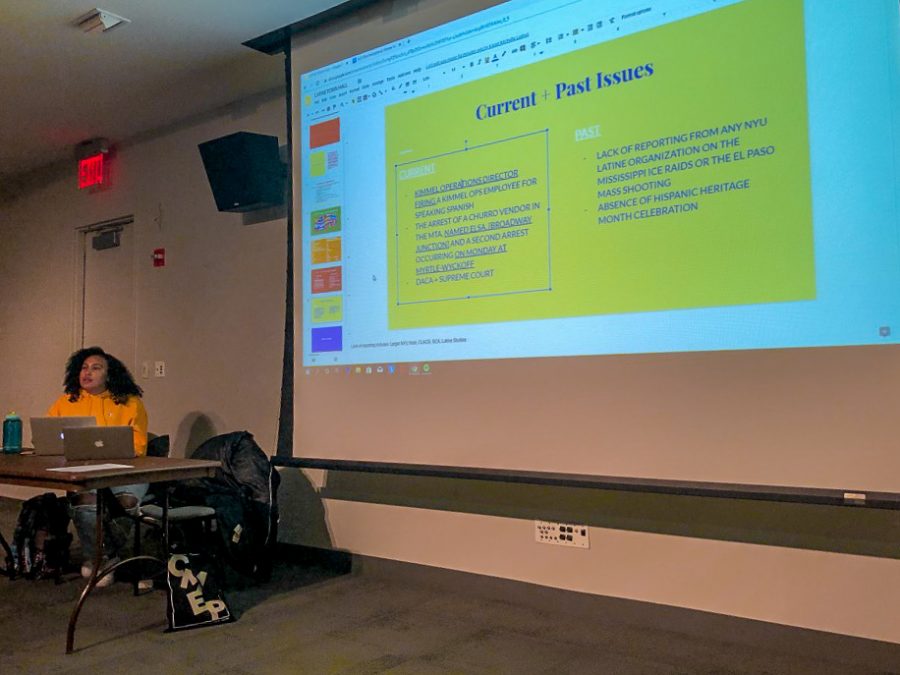NYU often boasts about it’s diversity — in its press release on the class of 2023, the headline was “NYU Admits Most Diverse Class in Its History” — but at an NYU Latine Town Hall on Wednesday, students said they felt underrepresented and not listened to.
At the town hall, hosted by Herencia NYU and Senator at-Large for Latine Students Karen Michelle Lemus, students brought up complaints largely against NYU’s support of Latine students. Many said they wanted the university to take more direct action, whether that be standing up for DACA students or doubling down on diversifying the student body.
Steinhardt senior Gaby García de la Noceda, president of the Puerto Rican Student Association, said NYU should focus on the recruitment of more socioeconomically diverse admits.
“I feel like NYU falls a lot on the fact that they have a lot of color or culture, but there’s almost no economic diversity,” García de la Noceda said. “There’s a dichotomy of students where financial aid is difficult to come by.”
As of 2018, 9.7% NYU’s population identified as Latine. In comparison to other universities, like Columbia University and the University of Southern California, for whom the corresponding figures hover a little under 15%, this is somewhat low. When it comes to socioeconomic diversity, 62% of students were from the top fifth in terms of average income, as of 2017.
CAS junior Alejandro Villa Vásquez said low socioeconomic diversity contributes to some Latine students feeling more underrepresented than NYU’s statistics suggest.
“I was so confused at first because being Latino/Hispanic has made it nearly impossible for me to connect to other students on the basis of shared culture/race/heritage,” Villa Vásquez wrote in his question for the town hall. “I realized the reason it doesn’t feel like almost one out of every 10 people in this university is Latino/Hispanic — and why people like me feel so isolated — is because most Latino students at NYU are white international students from upper-class backgrounds.”
Students from working-class backgrounds who do manage to attend NYU do not receive enough support, attendees said. They discussed the controversy over the Courtesy Meals Program, which provides students with Dining Dollars and meal swipes in hopes of alleviating food insecurity. Recently, some students had funds from their financial aid diverted to pay for their usage of the program, which has always been advertised as free.
Lemus said she wanted to see NYU better address the issue, although the university said they resolved it last Friday.
“I would like to see more actionable steps by NYU themselves not only through an acknowledgment or letter, but rather through promoting organizations: a call to action,” Lemus told WSN.
Students were similarly unsatisfied with NYU’s current efforts regarding DACA, of which the U.S. Supreme Court is currently debating the legality. While NYU signed an amicus brief defending the legislation alongside other universities, one student said she was hesitant to file taxes through the Higher Education Opportunity Program, as her father is undocumented. She said her hesitation stemmed from a concern about not knowing where the information would be going.
“With the DACA decision coming under the Supreme Court soon, NYU did sign on but nothing else beyond that has been visibly done. Students want actions from the university,” Lemus said to a crowd of around 30 students. “We need more transparency on NYU’s end, as they will see how students want to support DACA.”
Academic Advisor Hector Perea Jr., who specifically acts as a diversity advisor, also attended the event. An alumnus, Perea said he has seen the issue from the perspective of a staff member and a student.
When students raised the issues of inclusion within the classroom, Perea encouraged them to be vocal about their concerns.
“It’s important to incorporating other cultures and identities into a course, and the best way to start is by raising concerns in class,” Perea said at the event. “Look at the syllabus and see what types of people, like authors, are included in the syllabus in terms of race, gender and others.”
Students said the next step would be to participate in writing letters of support and to push for action.
“The town hall allows us to voice our concerns,” said Tandon sophomore Joanna Mira-Villa, secretary of Latinos Unidos Con Honor y Amistad. “We want to see the university take more direct action.”
For García de la Noceda, the town hall displayed students’ power in discussing and taking action on problems facing Latine students.
“I am not leaving away with any frustrations because I think students are dedicated to these issues and are trying to address these concerns,” Noceda said. “I think holding a town hall like this is a great step in seeing ways in which we can foster more Latine community.”
Disclaimer: Alejandro Villa Vásquez was a deputy managing editor at WSN in fall 2018.
Email Roshni Raj at [email protected].


























































































































































